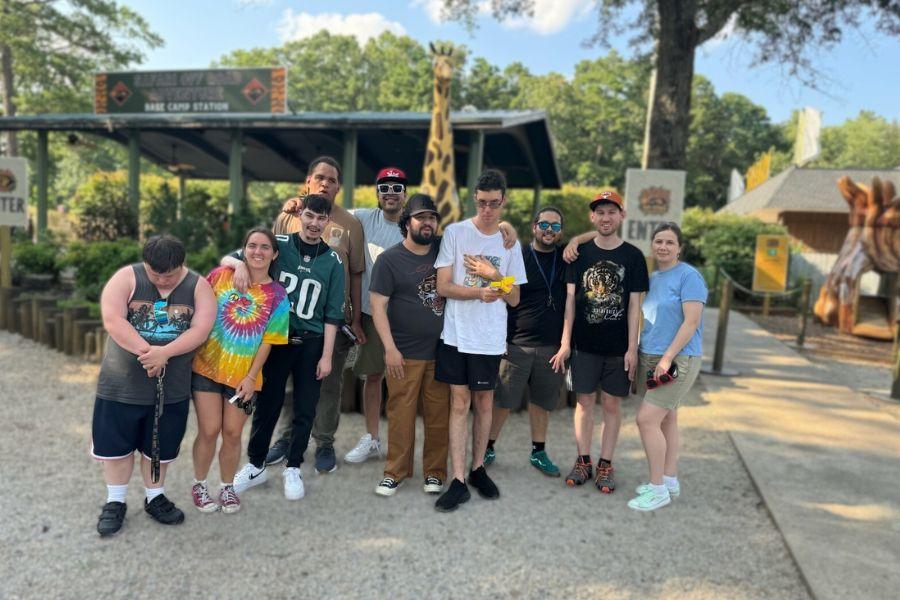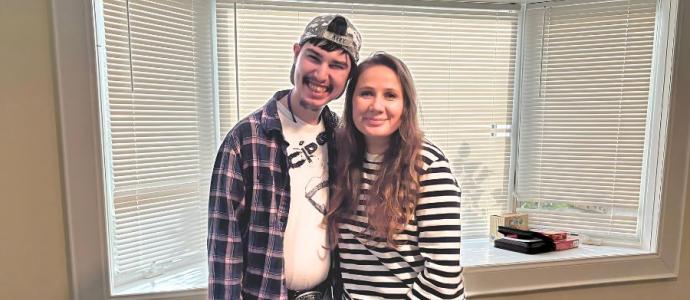Share
After a grueling three-day journey across continents, Mariia Naberezhna finally arrived in the U.S. in October 2022. Exhausted and jet-lagged, she landed at JFK International Airport with just two suitcases. Her only familiar face in this vast, foreign country was her sister. Naberezhna carried a precious amulet, a parting gift from loved ones back in Ukraine.
Although her journey to the U.S. was anything but straightforward, Naberezhna now proudly calls herself a direct support professional (DSP) at YAI. She works with six young men with intellectual and developmental disabilities (I/DD) at a residence in Westchester, New York, and loves her job.
Naberezhna is one of approximately 2,100 DSPs currently working at YAI. Despite being the backbone of any I/DD agency, the profession faces a severe staffing shortage. DSPs not only teach life skills but preserve the delicate balance of knowing how to provide just the right amount of support, enabling people with I/DD to live as independently as they can. According to Care Management Alliance of New York, the vacancy rate has skyrocketed to an average of 25%, nearly triple what it was in 2018.
But for people like Naberezhna and others with valuable life and work experiences, the DSP role offers a unique opportunity to apply their skills and feel truly valued. The job is a chance to flex their often-untapped skills and become key members of a supportive community that not only embraces their talents but celebrates their contributions.

“The guys who live in the house and my coworkers are my first friends in this country and now they are my family,” said Naberezhna. “Of course it was hard to adapt in the beginning, but I had a chance to get accustomed to the new culture and way of doing things and I feel happy being here.”
Naberezhna is a Ukrainian refugee who fled her country in search of a better future after the ongoing war made living conditions in her homeland unsafe. She reunited with her older sister who lives in Westchester and currently lives with her.
She came to the country through the U.S. Refugee Admissions Program, a long-term solution for people seeking humanitarian protection and permanent resettlement because they are unable to remain in their native countries.
With a medical degree from Ukraine and a background in cosmetic dermatology, Naberezhna is one of the 564,480 refugees who have been admitted to the U.S. as legal residents in 2024 so far, according to the U.S. Department of State. Of those, 4,802 currently reside in New York State.
“It can be incredibly isolating when you come to U.S. as a refugee and for many, having a job can be a social connection to the community,” said Annie Ryan, Economic Self-Sufficiency Program Manager with Refugee Resettlement and Integration at Commonpoint Queens, a nonprofit that provides social service programs to a wide range of people in New York City. “It really is fantastic when they don’t see their job as just a way to pay bills but a place to grow and apply their incredible work ethic and dedication while eagerly giving back to their new communities.”
Ryan and her team initially worked with Naberezhna, who didn’t speak English when she arrived, and helped set her up with English classes, Medicaid, and employment services.
Through a partnership with YAI, Commonpoint Queens referred Naberezhna for a DSP position, and she was hired in March of 2023 when her English was still very limited. With dedicated language classes and practice, Naberezhna has surpassed expectations. Her most recent victory was passing the AMAP exam, which certifies her to safely administer medication to the people she supports.
“What really matters is the human touch,” said Tina Michell, a Float Pool Manager at YAI who oversees a pool of DSPs who cover shifts and offer temporary stability to programs experiencing high turnover rates or vacancies, and who hired Naberezhna. “The reality for Mariia and many others is that they are coming here as immigrants who have education, degrees, and careers that don’t translate in the U.S. but that’s an opportunity for us.”
For Naberezhna, the special connection she shares with the men in the home where she works is what keeps her going and fuels her passion for helping others. One resident in particular, Edward Gabari, shares her love for arts and crafts. On any given day the two can be found working on creative projects together such as making a football helmet out of reusable shopping bags or building intricate designs with Legos. And, on days when Naberezhna struggles to find the right English word, "Eddy," as she affectionately calls him, is always there to help.
“Eddy and this job have taught me how kind the world can be and how kind we can be to one another,” she said. “It gives me hope and trust in humanity.”

